Food Crisis in West Africa: Our perspectives on assistance and cooperation —Tsumura Yasuhiro, WFP Country Director in The Gambia and Amameishi Shinjiro, Deputy Director-General, Economic Development Department, JICA
2022.10.13
The number of people world-wide who are suffering from hunger is rapidly increasing as the result of major problems, including climate shocks, the Covid-19 pandemic, and the Russian invasion of Ukraine. West Africa is facing some of the worst of these problems. Tsumura Yasuhiro, Country Director of the UN WFP in The Gambia, has been involved with food assistance activities in Africa for many years, and Amameishi Shinjiro, Deputy Director General of the Economic Development Division, is in charge of agriculture and rural development in Africa at JICA. We asked them about the current state of the food crisis in West Africa, the various factors behind it, and what can be done to solve the problem.
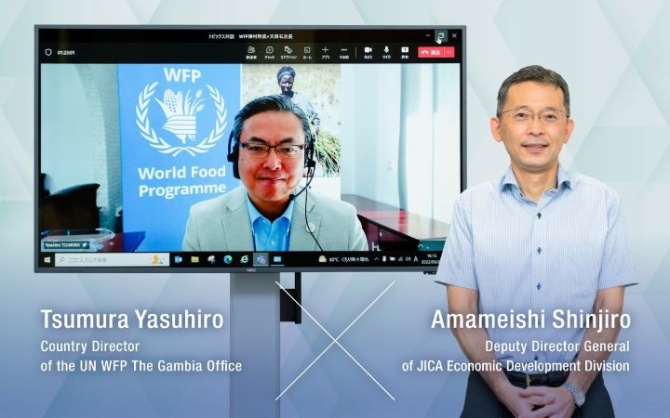
——The world is facing a severe food crisis following the spread of Covid-19 and the Russian invasion of Ukraine, with increasing numbers of people suffering from hunger. How would you describe the current situation?
Tsumura Yasuhiro:
Acute food insecurity is defined as a situation that requires immediate assistance as it poses imminent danger to the lives and livelihoods of those affected. According to the WFP, acute food insecurity is estimated to be affecting 345 million people in 82 countries in 2022. This is an increase of about 200 million compared to 2019, before the spread of Covid-19, and it is the worst rate ever recorded. The reasons are twofold. First, the supply chain has been severely impacted by border closures and movement restrictions during the pandemic. Then, just when we felt that Covid-19 was finally subsiding, the Russia-Ukraine crisis started. The food supply situation has continued to deteriorate, and we are concerned that this global food crisis will persist for some time.
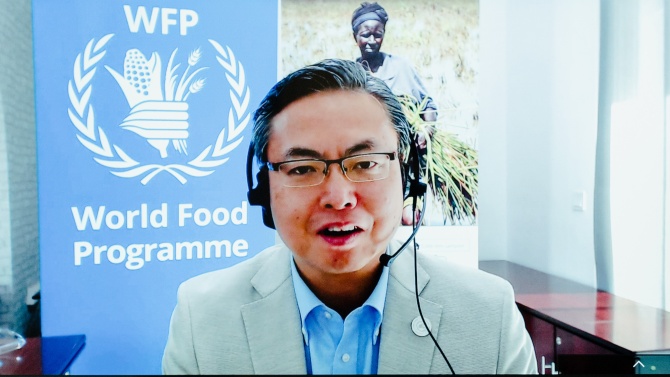
Tsumura Yasuhiro, United Nations World Food Programme Country Director in The Gambia. He joined WFP in 1998 after working for a private company and a non-for-profit organization in Japan. He has been serving WFP in the Central African Republic, the Democratic Republic of Congo, Italy, Japan, Kenya, Kosovo, Mauritania, Senegal, Sierra Leone and The Gambia with various functions ranging from food assistance activities in the field, policy coordination and school feeding services at the Rome headquarters, to Government liaison at the Japan Office. He participated in this interview on line from The Gambia.
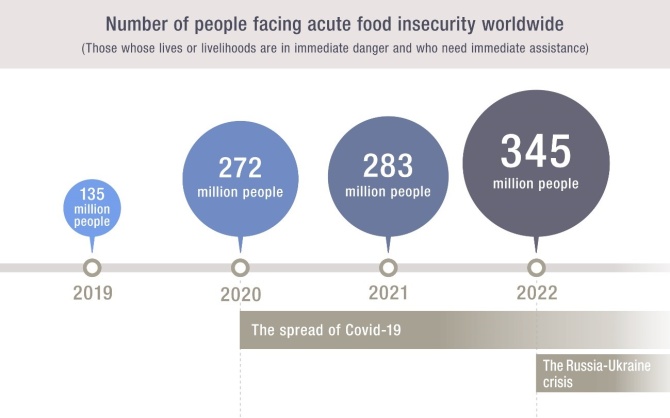
From the WFP
Amameishi Shinjiro:
We are also taking this difficult situation very seriously. JICA has a long history of working toward sustainable development in developing countries in areas such as eradicating hunger, developing agriculture, and improving nutrition. The percentage of the undernourished had been gradually declining since around 2000. Unfortunately, the number began to rise around 2014, especially in Africa, due to difficult economic conditions, extreme weather events, and political instability. The spread of Covid-19 was another major blow. Then, as noted by the WFP, conflict became a contributing factor to last year's food shortages. We recognize that Africa is in a difficult situation, facing multiple crises.
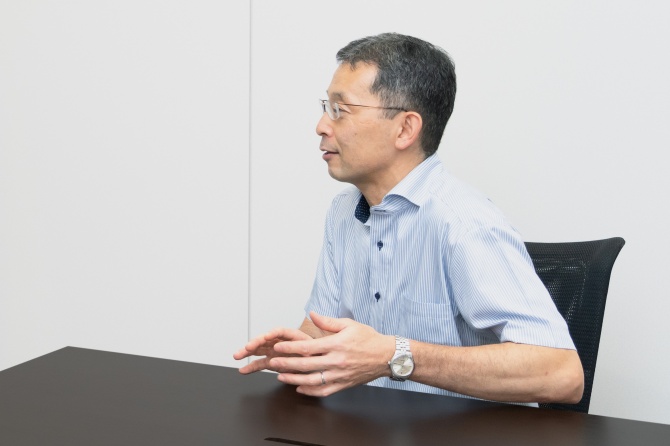
Amameishi Shinjiro, Deputy Director General of the Economic Development Department (Agricultural and Rural Development Group 2) at JICA, joined the organization in 1994. He has held prior positions as a Laos expert and finishing duties at the FAO Regional Office for Asia and the Pacific (Young Professional Officer) and the JICA Tanzania Office. He worked at the JICA Kenya Office from 2016-2020, where he was in charge of agriculture-related projects, among others. He is currently involved in agricultural development mainly in Africa and the Middle East-Europe region.
——What is the current situation in West Africa, which is suffering from a severe food crisis, and what are the factors that have caused it?
Mr. Tsumura:
In West Africa, changes in the climate have been increasingly causing irregular weather, leading to frequent droughts and floods, and making it difficult to secure sufficient food production and supply. Since many West African countries are suffering from chronic poverty and weak governance, an increase in food prices could quickly lead to demonstrations and political unrest. As a matter of fact, attempted military coups, some successful, have occurred in several countries. When natural resources such as water and available pasture become scarce due to irregular weather caused by changes in the climate, conflicts could occur over the scarce resources, forcing people to leave their villages. Further conflicts could develop as this migration becomes another destabilizing factor. Various issues, such as irregular weather, unstable economies, political instability, and conflicts are all connected, and all of these play a part in the food crisis. The Gambia is currently experiencing the heaviest rainfall in the past 35 years, causing flooding in many areas, and emergency food assistance is being provided to the victims.
West Africa relies on imports from Russia and Ukraine for much of its fertilizer used in agricultural production. This year, 40 percent of the amount of required fertilizer has not yet been secured, which is likely to lead to significantly lower yields during the next harvest.
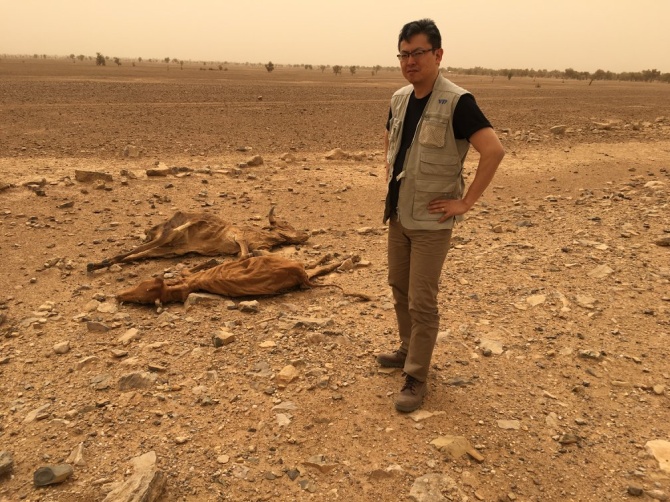
Mauritania, West Africa. Mr. Tsumura stands beside the carcasses of livestock that have died due to drought.
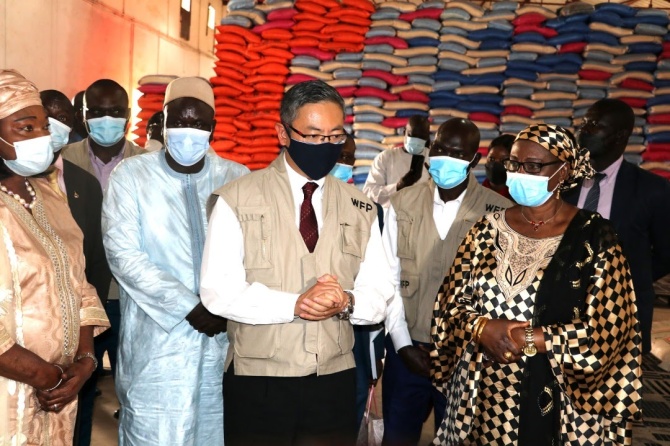
Mr. Tsumura (center) discussed emergency food aid with Gambian government officials as a safety net for the most vulnerable during the Covid-19 pandemic.
Mr. Amameishi:
I think it is precisely Africa's vulnerability to unexpected events that is causing this severe food crisis. When I was in Kenya for three and a half years, the country faced extreme annual weather events such as droughts and heavy rains, but not enough countermeasures were taken at the time. The question will be whether African countries will be able to develop the capacity to cope with such events.
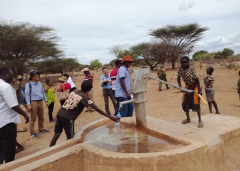
While stationed in Kenya, Mr. Amameishi (back center) inspected a well installed in an arid area in Turkana County in northern Kenya.
——What initiatives are needed to address the unprecedented food crisis that is taking place in West Africa, when various factors are connected?
Mr. Tsumura:
I have been working for the WFP for 14 years in Africa. I have been involved in food assistance activities in the Western African countries of Senegal, Mauritania, Sierra Leone, and The Gambia. The WFP provides emergency assistance to victims of conflict and natural disasters through programs such as food distribution as well as the transfer of cash to purchase food. At the same time, we have also been responsible for supporting self-reliance, helping to build strong and resilient communities and nations with an enhanced capacity to respond to disasters and other sudden shocks. Many countries in West Africa are particularly vulnerable to various unexpected disasters and shocks, and medium- to long-term development assistance is essential.
In The Gambia, the WFP is currently supporting a “Home-Grown” school feeding initiative to promote school meals that are prepared using food products purchased from local smallholder farmers. It aims to improve the nutrition of children and break the vicious cycle of poverty by creating self-reliant communities. In Sierra Leone, we have also worked with JICA to promote the dissemination of rice cultivation and irrigation technology.
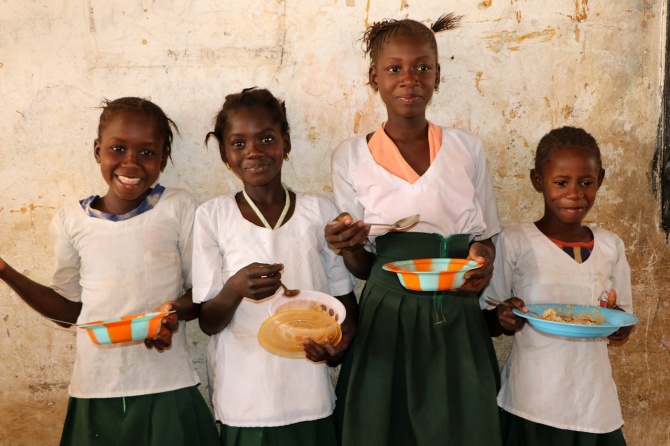
Children eating their school lunch at an elementary school in The Gambia.
Mr. Amameishi:
In Africa, JICA is promoting the SHEP (Smallholder Horticulture Empowerment & Promotion) approach, which aims to make agriculture "profitable" for producers, and the CARD (Coalition for African Rice Development) initiative, which aims to support the efforts of African countries to increase rice production. Taking a long-term perspective in the agricultural sector, we are working on developing farmers’ skills to increase their ability to cope during times of hardship. The WFP is involved in development assistance as well as emergency humanitarian aid, and I hope that we can leverage each other's strengths to increase the resilience of vulnerable countries.
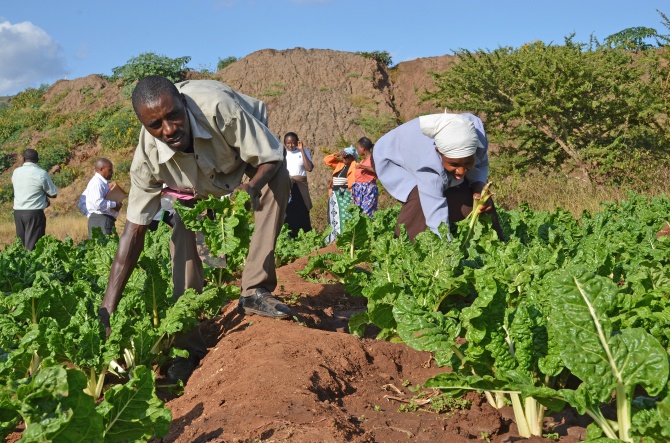
Kenyan farmers grow marketable vegetables, implementing JICA's SHEP (Smallholder Horticulture Empowerment & Promotion) approach.
Mr. Tsumura:
As the food crisis issue becomes more complex, it is important that we work with various organizations to complement each other’s efforts. At schools, a number of efforts are underway to coordinate the promotion of health, nutrition, and education related initiatives, such as “home-grown” school feeding. We would like to strengthen our collaboration with other institutions.
——What kind of support is needed to prepare for possible future food crises?
Mr. Tsumura:
We need to take a comprehensive look at food security. It is important to view all the stages of production, harvesting, processing, distribution, sales, and consumption as a “food system”. And we need to involve all the relevant public and private actors in support efforts. We should also consider the development of a food reserve mechanism.
In West Africa, particularly in The Gambia, young people continue to migrate from rural to urban areas because agriculture is not a profitable option for them. If farming were a lucrative and attractive business, more people would want to engage in it. We wish to develop projects that are not just helping people to survive but are leading to the creation of a “business” within the food systems. I feel that conventional approaches to eradicating poverty have reached their limits. We would also like to build partnerships with the private sector.
Mr. Amameishi:
It is essential to strengthen the food and agriculture sector at all levels, from the national to the individual. In 2003, the African Union (AU) declared that at least 10 percent of the national budgetary resources would be devoted to agriculture and rural development. However, this has not been achieved in many countries due to the many development issues. Food security is necessary for human beings to live with dignity. We believe that African countries and development aid agencies should take a lesson from this food crisis and take another look at the agricultural sector. It is also necessary to strengthen field-level initiatives for small farmers and others.
——Food prices are rising around the world, so the food crisis caused by the Covid-19 pandemic and the invasion of Ukraine is also a concern for developed countries. Is it important for everyone to recognize the global food crisis as something that affects us all?
Mr. Amameishi:
Why do food crises occur in some regions while the food-production level in the world as a whole continues to increase? It is because countries that are powerful and capable of responding to unexpected events are able to secure food supplies when such events happen, while countries that are less powerful and more vulnerable are unable to do so. An increasing number of countries and people are presently threatened by limited access to food. Now, with so much attention being paid to the food crisis, it’s important to raise our awareness towards the reality of these issues.
Mr. Tsumura:
I think everyone has personally felt the effects of the Covid-19 pandemic and the Russia -Ukraine crisis. Everyone in the world faces the same problems and we are all interdependent on one another. It would be great if we could recognize and understand this reality, and if that could drive each of us to take action. We might not fully meet the target deadline of 2030 for achieving SDG Goal 2 of “Zero hunger”, but we would like to get as close to that goal as possible. We will continue to share the information from the field in West Africa.
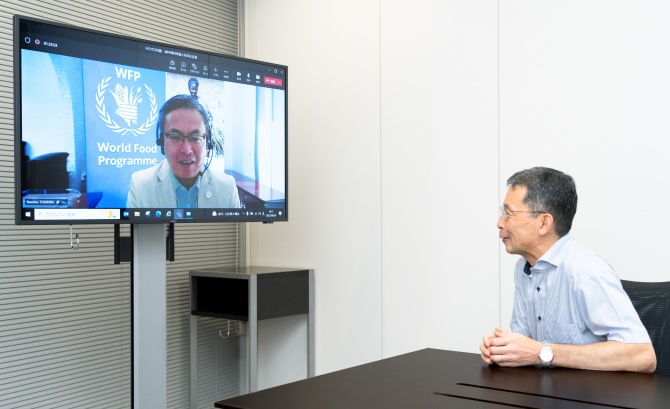
scroll